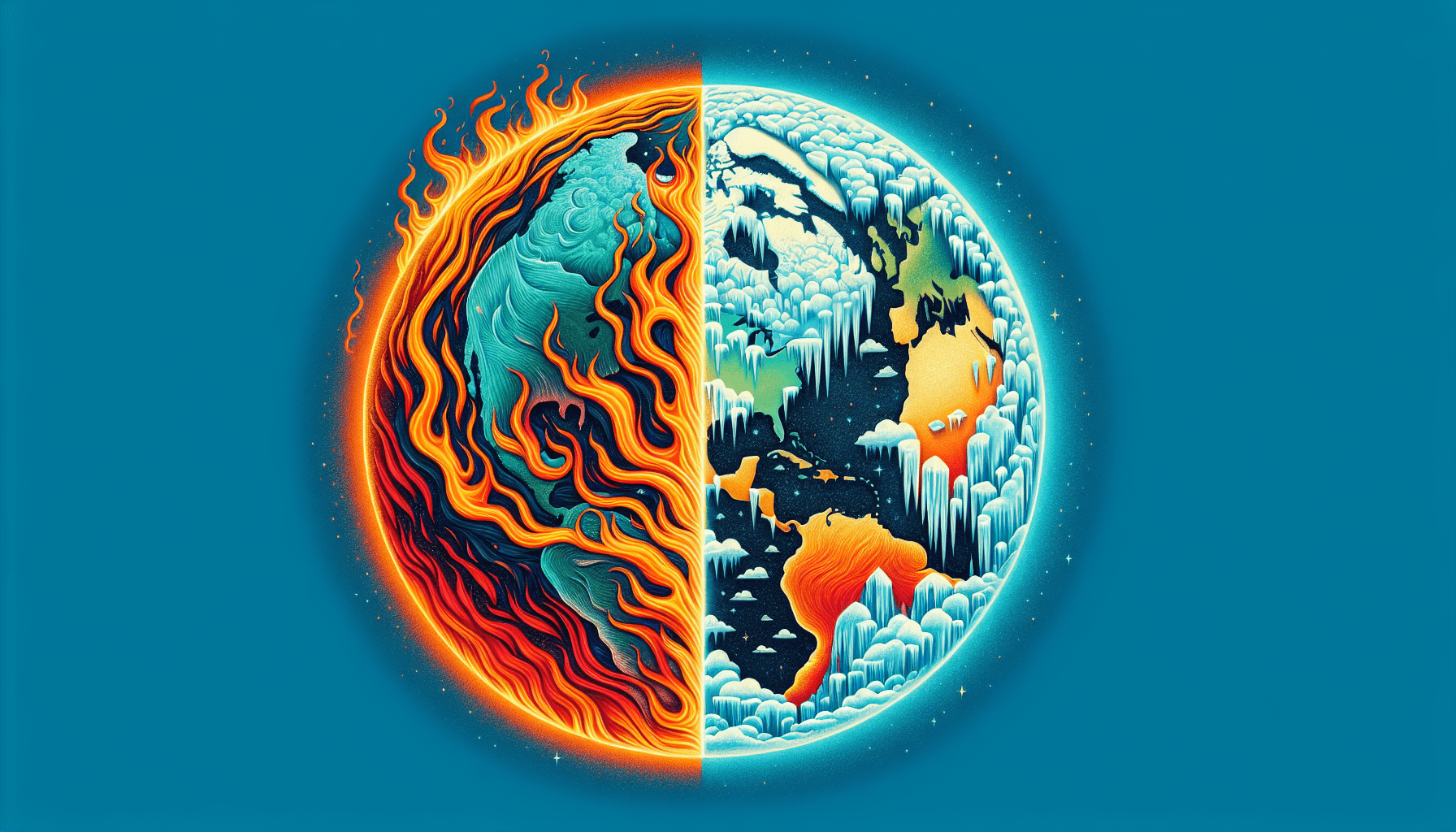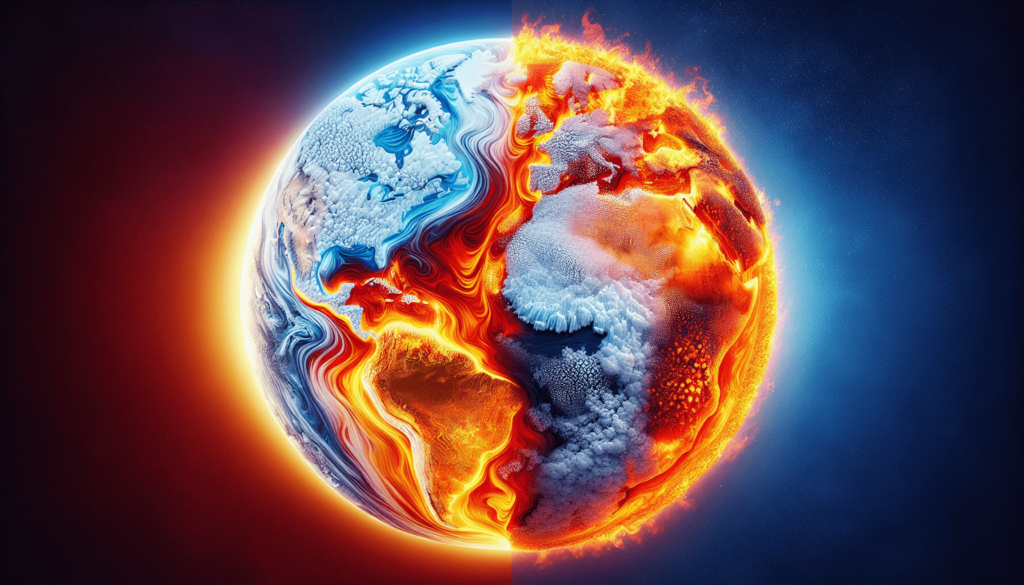
Is The Earth Getting Warmer Or Colder?” dives into the ongoing debate about Earth’s changing climate, exploring the evidence and perspectives on both warming and cooling trends. You’ll get to understand the data behind these climate changes, how it affects our daily lives, and what scientists say about the future of our planet. This friendly guide will help you make sense of the information and grasp the broader implications of our shifting environment. Have you ever wondered, “Is the Earth getting warmer or colder?” It’s a question that often pops up in conversations about climate change, and it’s one that continues to spark considerable debate. Unraveling the complexities of Earth’s climate is no small feat, but don’t worry—we’re here to break it down for you in an approachable and friendly manner.
Understanding Climate vs. Weather
Before diving into whether the Earth is getting warmer or colder, let’s clear up a common confusion: the difference between climate and weather.
What is Weather?
Weather refers to the short-term atmospheric conditions in a specific place at a specific time. It includes conditions like rain, snow, sunshine, wind, and temperature over a short period, usually hours to days.
What is Climate?
Climate, on the other hand, is the average weather conditions over a long period, generally over 30 years or more. When we talk about climate, we’re looking at long-term patterns and changes.
By better understanding the difference between these two, you can appreciate why a particularly cold winter doesn’t necessarily mean that the Earth isn’t getting warmer in the long run.
The Historical Perspective
Past Climate Cycles
The Earth’s climate has gone through numerous changes throughout its long history. There have been periods of extreme warmth and ice ages. Scientists study this past climate using various methods, such as ice cores, tree rings, and sediment layers.
Milankovitch Cycles
The Milankovitch cycles—a series of changes in the Earth’s orbit and tilt—are natural phenomena that affect the climate over tens of thousands of years. These astronomical changes have caused significant shifts in Earth’s climate throughout geological history.
Understanding these cycles helps us put current climate changes into better perspective. However, today’s situation is unique due to the accelerated rate of change.

Current Climate Data
Rising Global Temperatures
In the modern era, numerous studies indicate that the Earth is indeed getting warmer. According to data from NASA and the National Oceanic and Atmospheric Administration (NOAA), the global surface temperature has risen significantly since the late 19th century.
| Year | Temperature Anomaly (°C) |
|---|---|
| 1880 | -0.16 |
| 1930 | -0.05 |
| 1960 | 0.03 |
| 1990 | 0.37 |
| 2020 | 1.02 |
The table above outlines some key points in temperature anomalies from the 1880s to 2020. The temperature anomaly represents how much the average temperature deviates from a baseline period.
Greenhouse Gas Emissions
Greenhouse gases, such as carbon dioxide (CO2), methane (CH4), and nitrous oxide (N2O), trap heat in the atmosphere. The industrial revolution marked a significant increase in these emissions, leading to accelerated global warming. CO2 levels have risen from approximately 280 parts per million (ppm) in pre-industrial times to over 410 ppm today.
Ice Melt and Sea-Level Rise
Glaciers and ice sheets are melting at alarming rates. The loss of ice contributes to rising sea levels, which have increased by about 8 inches since 1880. This affects coastal communities and ecosystems, and can exacerbate natural disasters like hurricanes and floods.
Evidence of Warming
Melting Polar Ice
Both the Arctic and Antarctic regions are losing ice at an unprecedented rate. This not only contributes to rising sea levels but also affects global weather patterns.
Heatwaves and Extreme Weather Events
Heatwaves are becoming more frequent and intense globally. Headline-grabbing heatwaves in Europe, North America, and Australia provide real-world examples of how our planet is warming.
Ocean Temperatures
Oceans absorb most of the Earth’s excess heat. According to NOAA, the top 700 meters of the ocean have warmed by 0.18°F since 1969. Warmer ocean temperatures affect marine ecosystems, coral reefs, and increase the intensity of hurricanes.

The Impact of Climate Change
Environmental Effects
Climate change has a multitude of environmental effects. Forests are more prone to wildfires, and disruptions in habitats are causing species to migrate or face extinction. Coral reefs, critical to marine biodiversity, are dying off due to warming waters and increased acidity.
Societal Effects
Human activities and settlements are not immune to climate change. Increased frequency of natural disasters, heatwaves, and rising sea levels affect food security, health, and can lead to displacement of communities.
Economic Consequences
The economic impact of climate change is massive. Damage to infrastructure from natural disasters, loss of productivity due to extreme weather, and costs of adaptation measures are just a few examples of economic strains.
Counterarguments: Is the Earth Getting Colder?
Natural Cooling Processes
Some argue that natural processes like volcanic eruptions and solar activity contribute to cooling. Volcanic eruptions, for example, can release particles that reflect sunlight, temporarily cooling the Earth. However, these are generally short-term effects.
The Role of Media and Misinterpretation
Skeptics often point to specific cold events or seasons as evidence against global warming. These arguments usually stem from a misunderstanding of the difference between weather and climate.
What Scientists Say
Consensus on Global Warming
A strong consensus exists among climate scientists that the Earth is warming. Studies show that 97% of climate scientists agree that human activities are a significant contributor to recent global warming.
| Source | Agreement Percentage |
|---|---|
| NASA | 97% |
| NOAA | 97% |
| IPCC Reports | 97% |
| AAAS | 97% |
IPCC Reports
The Intergovernmental Panel on Climate Change (IPCC) releases comprehensive reports detailing the current state of climate science. These reports, reviewed by scientists globally, provide robust evidence of human-induced climate change.
What Can You Do?
Reducing Your Carbon Footprint
Every action counts when it comes to mitigating climate change. Consider reducing your carbon footprint by using public transportation, reducing energy consumption, and supporting renewable energy initiatives.
Advocacy and Awareness
Raising awareness about climate change and advocating for policies that address it are powerful tools. Engage in community efforts, use social media to spread the word, and support organizations working towards climate action.
Personal Choices
Simple changes in your daily life can make a big difference. Eating a plant-based diet, conserving water, and reducing waste are all steps you can take to contribute positively.
The Path Forward
Global Efforts and Agreements
Agreements like the Paris Agreement aim to unite countries in ambitious climate action plans. Although it’s a challenging journey, nations are gradually committing to reducing their carbon emissions.
Technological Advances
Emerging technologies in renewable energy, carbon capture, and storage, and energy-efficient practices offer hope. Investing in these technologies is essential for a sustainable future.
Education and Innovation
Education is key to equipping future generations with the knowledge and tools they need to combat climate change. Innovation in policy, technology, and community initiatives can drive significant progress.
Conclusion
So, is the Earth getting warmer or colder? The overwhelming body of evidence indicates that the Earth is indeed getting warmer, primarily due to human activities. While natural processes and short-term variations do occur, the long-term trend is one of rising temperatures and increasing climate impacts.
Understanding these complexities is essential, and taking action—no matter how small—helps contribute to a collective effort to mitigate climate change. Together, we can work towards a more sustainable and resilient planet for future generations.
Feel ready to tackle the topic of climate change in your next conversation? We hope this friendly guide has made the subject a bit clearer and more approachable for you. Let’s stick together and make a difference!
